“Our film programs the victory of Ukraine”: how was the world premiere of the film “Editorial” at the Berlin Film Festival – Publications
[ad_1]
On February 16, the world premiere of the film took place as part of the Berlin International Film Festival “Editorial” by Roman Bondarchuk. A full hall of people gave the Ukrainian film about the Kherson region a long round of applause and an almost 40-minute question-and-answer session.
Film reviewer UP. Culture Elizaveta Sushko tells how the audience reacted to the film, which was shot on the eve of the full-scale invasion and occupation of part of the Ukrainian South by Russians.
This year’s Berlinale program does not flaunt star names. But the art director(s), who are working their last year at the festival, allowed themselves to take a lot of bold cinema into various programs. This can be said about those tapes that explore the structure of their world – Bruno Dumont and his empire in a French village, the Zellner brothers and their Bigfoot in the North American forest, and Bondarchuk’s Kherson universe.
The premiere of “Editorial” gathered a lot of interested people, and Ukrainian men and women could be identified by wet eyes after watching. And the film crew and their friends are wearing blue and yellow badges of marmots like last year’s Berlin bears. This makes the festival different from other international events – there are always many Ukrainians here.
World premiere of “Editorial” in Berlin
Lisa Vlasenko
Roman manages to impress many. He returns from his previous film, the phantasmagoric “Volcano”, a direct and harsh satire in which Ukrainians recognize themselves or acquaintances. And with a sufficient level of self-criticism, they will even laugh at what is happening: whether it is the internal problems of the editorial office of the local newspaper or conspiracy theories and faith in a motivational coach as in God.
Seizing on the time between the covid pandemic and a full-scale invasion, Bondarchuk compiles fiction with reality. It can be strange for a foreigner, and painful for a Ukrainian viewer. First of all, from the post-Soviet South of Ukraine before a full-scale invasion.
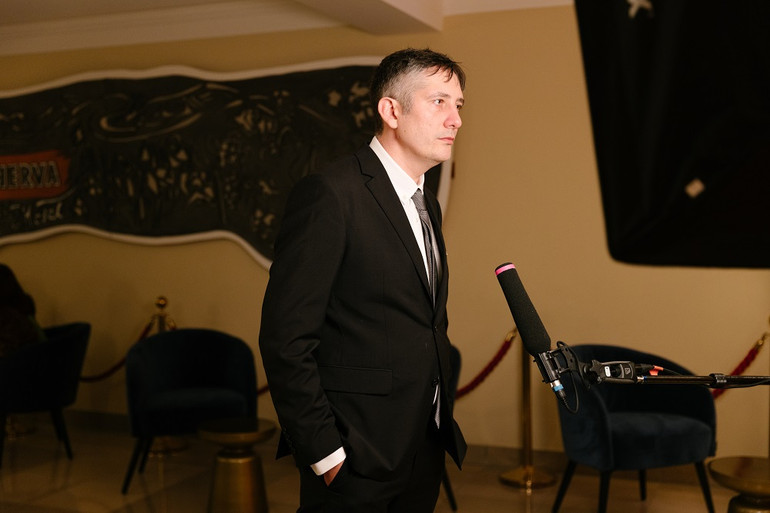
Roman Bondarchuk
Lisa Vlasenko
Continuing to create his cinematic universe, Bondarchuk made a spectacular, poignant film on the terrain of his native Kherson and the Oleshkiv sands. He fills it with stories that he has kept in his head and heart since he was 14 years old, when he started working in journalism. Now he’s cranking up his memories at full volume. Heroes and heroines are born here, and actors and actresses help him shape them – each with their own special background.
The main character of the film is Yura, an idealist journalist. He fights for justice, and mythologist Joseph Campbell would surely call him the Thousand-Faced Hero, who must go through his own path of transformation in order to do something about the system. The situation in the region is disappointing – forests are burning on the horizon without stopping, and in order to report this to Europe or at least to reach local newspaper editors, you need to maneuver between the election campaigns of future mayors. They dance on social networks, do actions against each other, and the main candidate gives out virtual promises from a coma.
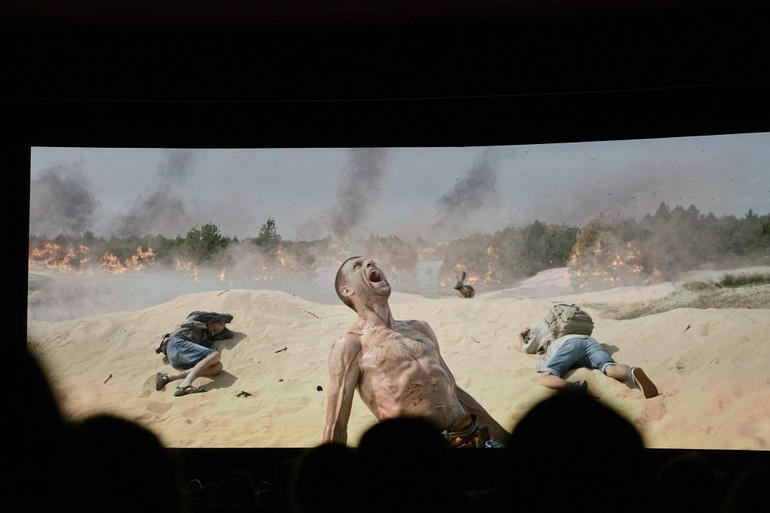
Screening of “Editorial” at the Berlinale
Lisa Vlasenko
“The mixing of genres and a certain surrealism came about by accident. But we came to it in an effort to show this nightmare, old-fashioned politicians who are still trying to rule from a coma or create an eco-village for spiritualization” – says Roman Bondarchuk at the question-and-answer session after the world premiere.
In addition to his own memories from the newspaper “Hryvnia”, where Roman’s father worked, and the future director worked as a teenager and gained experience as a photographer, the film was based on Dmytro Bagnenko’s research and investigation about the burning of forests in the Kherson region and the illegal actions of the authorities against nature and the community. Dmytro eventually played the main role, guiding the viewer through his adventures to the truth.
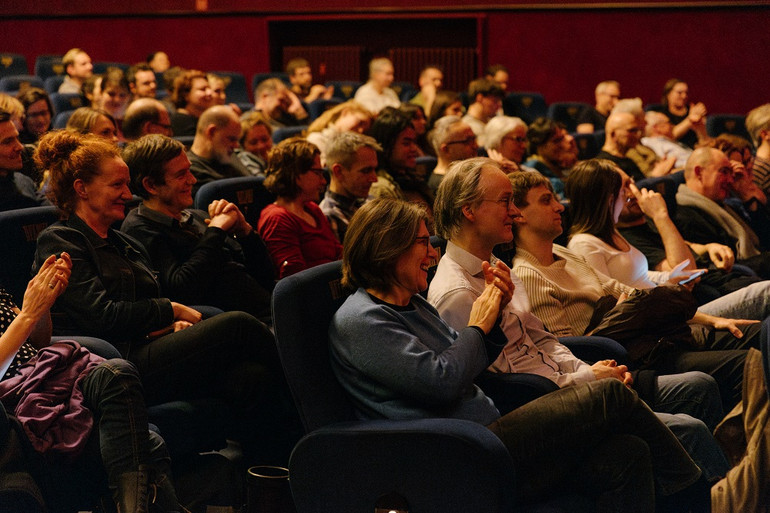
The first viewers of “Editorial”
Lisa Vlasenko
He will have to meet the corrupt police, and bandit shootouts, and attacks, and his mother (Rymma Zyubina) with her murky lover and faith in reptilian preachers, and even grow up and fall in love with a feminist (Zhanna Ozirna).
At the Q&A, a question was raised from the hall: “I’m from Kherson. All this was very close to me. But will our journalism, our system, come out of this surrealism, which dragged us into a hole and forced us to lose part of our identity? The finale of the tape is the hope that we will find it?”
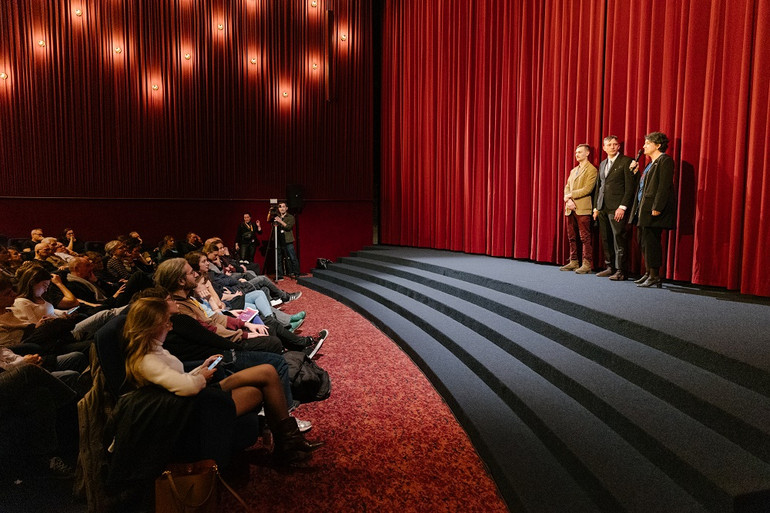
Conversation with the audience
Lisa Vlasenko
“Editorial” is a tape that gives hope that we will get rid of surrealism after victory. I hope that we will return to the Kherson region and see the Ukrainian mountains of Crimea, that we will overcome sexism and misogyny. But that thousands of people who believe in a wolf in sheep’s clothing, in this case a politician in the form of a preacher, will find their own opinion, strength and take root.
The level of surrealism of this hope is difficult to understand. But it is there, even when you hear the most painful things: about the team members who died in the war – editing director Viktor Onysko and actor Vasyl Kuharsky, to information about the consequences of the Russian invasion of the Kherson region, which the film team is currently showing as part of an exhibition near the Brandenburg Gate in the center of Berlin.
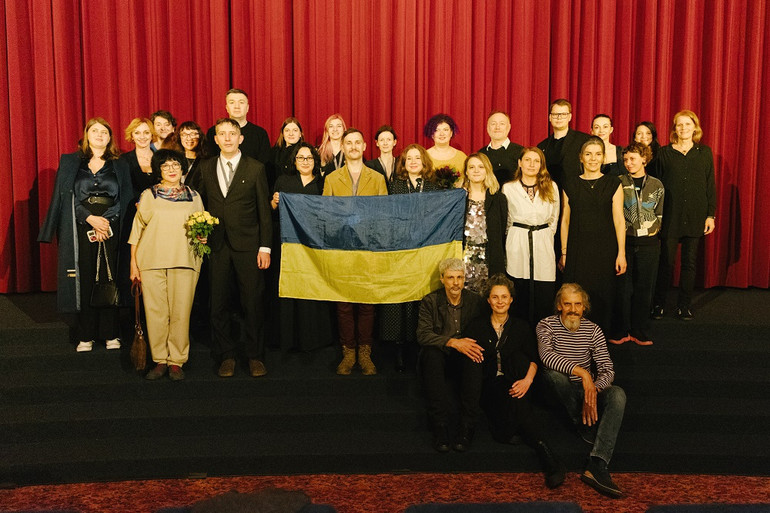
Lisa Vlasenko
Bondarchuk’s “Editorial” also won favorable reviews from international critics. It has been compared with the works of Finnish film director Aki Kaurismäki and even Richard Bach’s story-parable “Jonathan Livingstone Seagull”. “This film may come as a surprise to Western media consumers who are used to seeing Ukraine as a brave outsider standing up to the power of Moscow. Bondarchuk wrote neither a love letter to Ukraine nor a full accusation. Perhaps it is better seen as a complex elegy of the country’s potential, a surreal expression of mourning for a vanishing worldview based on a belief in the value of truth“, writes the columnist Variety.
“Behind the humor there are many serious points – from commissioned journalism and the desire for clickbait that fuels it, to the exploitation of the environment. While the film’s structure sometimes seems so shaky that it might fall apart, the strength of the direction holds it all together. In a news-hungry world where nothing is edited, the truth can be hard to see, even when it’s in plain sight“, the author of Eye for Film shares her impressions.
“Filmed just before the Russian invasion in February 2022, the looming war not only sets the mood of the film, but is a kind of meta-level framing.”– notes Cineuropa.
[ad_2]
Original Source Link











